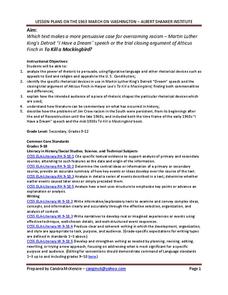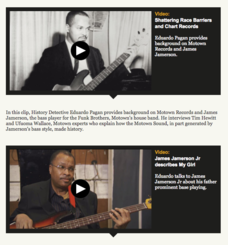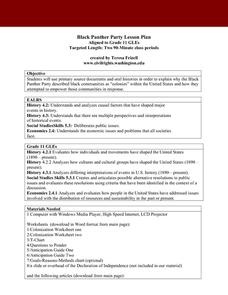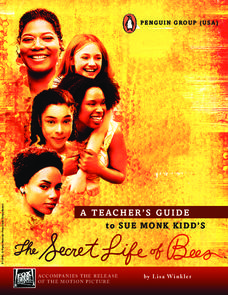National Woman's History Museum
Dolores Huerta and the Delano Grape Strike
Few have heard of Dolores Huerta and her part in organizing the California farm workers, establishing the United Farm Workers union and orchestrating the Delano Grape strike. High schoolers consider why this powerful woman has been...
Pulitzer Center
China's Rising Labor Movement
Young historians will explore the complex causes and effects of industrialization in China by perusing the numerous articles included in this webpage. Throughout the resource, there are many writing and discussion prompts to help direct...
University of Virginia
Uncle Tom's Cabin: Reading the Novel
Teach the importance of context and perspective with a unit focused on Harriet Beecher Stowe's Uncle Tom's Cabin. The first lesson considers the role of female characters and readers, including the gender expectations of the time. The...
John F. Kennedy Presidential Library & Museum
Analyzing the Inaugural Address
Get high school historians to step outside their own shoes by responding to JFK's inaugural address from the perspective of a civil rights activist, a soviet diplomat, or a Cuban exile. After a class discussion about the address, the...
Facing History and Ourselves
The Legacies of Reconstruction
The final lesson in the seven-resource Reconstruction Era collection examines the legacies of Reconstruction. Class members investigate why the period has been called an "unfinished revolution," "a splendid failure," and "the second...
Anti-Defamation League
The Road to Brown
As part of the study of segregation in U.S. schools, scholars research and create a timeline of events that led to the historic Supreme Court case, Brown V. Board of Education. Groups research a topic or event that led to the decision,...
Albert Shanker Institute
Making the Case for Equality: A Comparison
Martin Luther King Jr's " I Have a Dream" speech and Atticus Finch's closing argument during the trial of Tom Robinson both address the societal need to overcome racism. After examining the rhetorical devices and figurative language used...
US House of Representatives
A Picture is Worth a Thousand Words
New ReviewGroups select a photograph from one of the four eras of African Americans in Congress and develop a five-minute presentation that provides background information about the image as well as its historical significance. The class compares...
US House of Representatives
Black Americans in Congress Speak Their Mind
New ReviewTo conclude their study of Black Americans in Congress, groups select a statement made by one of the Members, examine the Member's profile on the provided link, and create a display that includes state represented, years of service, an...
National Endowment for the Humanities
Revolution '67, Lesson 1: Protest: Why and How
To some people, protesting is as American as apple pie, but the factors that lead to protests can be as confusing to veteran activists as to today's youth. Revolution '67 explores the riots in Newark, New Jersey as a case study. Using...
National Endowment for the Humanities
Revolution '67, Lesson 2: What Happened in July 1967? How Do We Know?
Even in a world in which dozens of participants and curious onlookers record every controversial event, the basic facts of what happened are often in dispute. Revolution '67, Lesson 2 explores 1967 Newark, New Jersey using an examination...
PBS
The Sixties: Hitsville USA
James Jamerson. You probably heard him but may not have heard of him. But fans of Motown Records will certainly recognize his contributions to the sound that desegregated popular music during the 1960s. Challenge young history detectives...
Center for History and New Media
The Impact of the Jim Crow Era on Education, 1877–1930s
Even though American slaves were officially emancipated in 1865, the effects of slavery perpetuated throughout the 19th and 20th centuries. Middle and high schoolers learn about the ways that discrimination and the Jim Crow laws...
Anti-Defamation League
Harriet Tubman on the $20 Bill: The Power of Symbols
How important are symbols and symbolic gestures in society? Middle schoolers have an opportunity to analyze the importance of symbols on American currency with a lesson that investigates the controversies surrounding redesigning the $5,...
Center for History and New Media
Growing Up in a Segregated Society, 1880s–1930s
What did segregation look like in the beginning of the 20th century? Middle and high schoolers view images of segregated areas, read passages by Booker T. Washington and W.E.B. DuBois, and come to conclusions about how the influence of...
Stanford University
Letter from Birmingham Jail: The Power of Nonviolent Direct Action
What strategies are most effective in changing an unjust law? Class members examine the tactics used in the Birmingham Campaign of 1963 (Project C) to achieve social justice and social transformation. After examining documents that...
Curated OER
Black Panther Party Lesson Plan
Why did the Black Panther Party feel colonized, and what methods did they employ to achieve empowerment? Your class members will engage in an online PowerPoint presentation, analysis of several documents, and discussion in order to...
Historical Thinking Matters
Rosa Parks: 5 Day Lesson
What led to the success of the Montgomery Bus Boycott, and how might historians approach this question differently? This rich series of lessons includes a short introductory video clip, analysis of six primary source documents, and...
Penguin Books
A Teacher's Guide to Sue Monk Kidd's: The Secret Life of Bees
A 12-page teacher's guide to Sue Monk Kidd's The Secret Life of Bees provides the discussion questions and activities that lead readers to understand not only Lily's fears, but her reasons behind them.
Alabama Department of Archives and History
Marketing a Bad Idea: Why So Many People Joined the Klan in the 1920s
How did the Klu Klux Klan manage to gain so many members during the 1920s? Class members examine Klan documents and promotional materials to gain an understanding of the propaganda techniques used to attract members.
National Woman's History Museum
Create your own Women’s History Museum
Celebrate Women's History with a museum display. Divide the class into seven groups and assign each a different historical topic/time period. Each group member researches a different woman of that time period and creates an exhibit that...
Library of Virginia
Antebellum Freedom
From indentured servitude to involuntary race-based servitude, slavery has taken many forms in American history. Class members examine three manumission petitions that reveal how the rights of African Americans and African American...
CHPCS
The United States in the 1920s: The New Negro Movement and the Harlem Renaissance
Music, writing, and activism all tell the story of history! The resource uses these elements and more in a presentation to discuss the Jazz Age and Harlem Renaissance. Your class views biographies, discusses important events, and...
Curated OER
Concept Formation Lesson Plan: Understanding "Protest"
After analyzing both examples and non-examples of a variety of protests conducted by ethnic groups in Seattle and the state of Washington during the twentieth century, your class members will work to identify the key ideas and components...

























